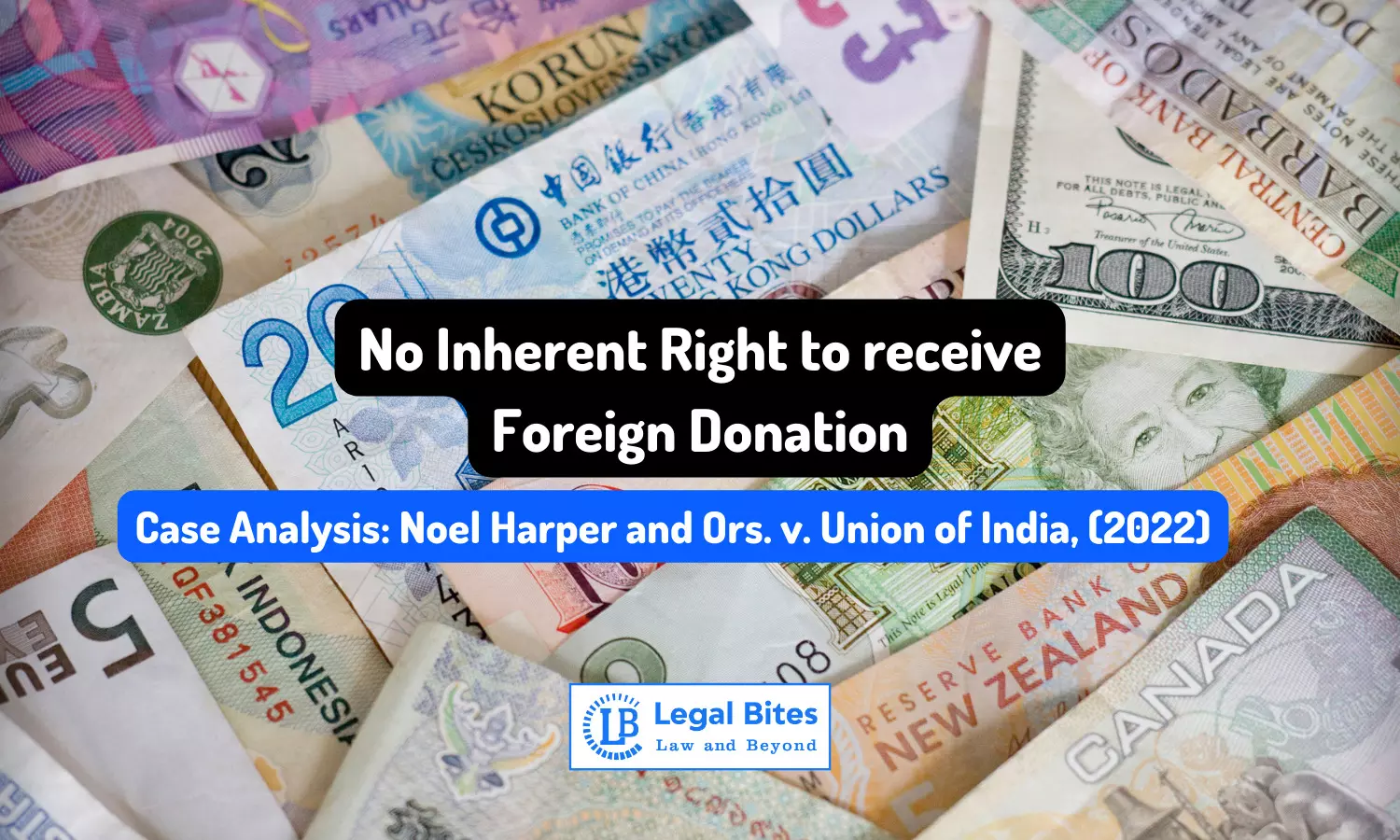Case Analysis: Noel Harper and Ors. v. Union of India, (2022) | No Inherent Right to receive Foreign Donation
The Case Analysis: Noel Harper and Ors. v. Union of India by Sukriti Verma will discuss the constitutional validity of the amendments in some provisions of the Foreign Contribution (Regulation) Act, 2010 by the virtue of the Foreign Contribution (Regulation) Amendment Act, 2020.

The Case Analysis: Noel Harper and Ors. v. Union of India will discuss the constitutional validity of the amendments in some provisions of the Foreign Contribution (Regulation) Act, 2010, by virtue of the Foreign Contribution (Regulation) Amendment Act, 2020.Court: Supreme Court of India Bench: Justices A.M. Khanwilkar, Abhay S. Oka & C.T. RavikumarCitation: Writ Petition (Civil) No. 566 OF 2021Date of Judgment: 8th April 2022Facts There was a trust named the Care and Share...
The Case Analysis: Noel Harper and Ors. v. Union of India will discuss the constitutional validity of the amendments in some provisions of the Foreign Contribution (Regulation) Act, 2010, by virtue of the Foreign Contribution (Regulation) Amendment Act, 2020.
Court: Supreme Court of India
Bench: Justices A.M. Khanwilkar, Abhay S. Oka & C.T. Ravikumar
Citation: Writ Petition (Civil) No. 566 OF 2021
Date of Judgment: 8th April 2022
Facts
There was a trust named the Care and Share Charitable Trust, petitioner 1 is serving as one of the trustees of the Trust. Petitioner No. 2 (Nigel Mills) is a social worker and one of the trustees of the stated Trust.
The Trust is registered under the Income-tax Authority and Ministry of Home Affairs. The trust is also registered under the Foreign Contribution (Regulation) Act, 1976 for receiving foreign funds. The petitioner Nos. 3 and 4 are also trustees of the National Worker Welfare Trust (NWWT). This trust is also registered with the ministry of home affairs and is also registered under the Foreign Contribution (Regulation) Act, 1976 for receiving foreign funds.
The petition contends following the provisions of the Foreign Contribution (Regulation) Amendment Act, 2020 arbitrary, unreasonable, ambiguous, and overbreadth:
1) Cancellation of the Certificate (section 14 of the Foreign Contribution (Regulation) Act, 2010.
2) Bar from receiving foreign contributions in the FCRA account (section 17(1)).
For this reason, the trust and the similarly placed persons shall be obligated to shift to the new regime and open new FCRA Accounts In the specified branch before the designated date.
The petitioners contend that this account shall be opened at only one place, the State Bank of India, New Delhi, Main branch, which creates many logistical issues because of the verification of accounts at different locations. This interfered with the acceptance and utilization of foreign contributions.
The petitioners contended that this is violative of Articles 19(1)(c), 19(1)(a), and Article 14.
3) Prohibition on transfer of foreign contribution (Section 7 of the same Act).
This will affect the collaborations in developing eco-system(s), for small grassroots-level organizations that may not be able to submit the detailed proposal required for obtaining permissions or getting grants from other foreign countries.
4) Mandatory production of Aadhar Card details of office bearers/functionaries/directors of the societies/trusts for identification documents for the purpose of registration, grant of the new certificate, or renewal of the old certificate. For the petitioners have referred to the judgment of K.S. Puttaswamy (Retired) & Anr. (AADHAAR) v. Union of India & Anr., (2019) 1 SCC 1.
The amendment of 2020 will affect the foreign contributions worth Rs 16,343 crore as they have increased from Rs. 10,282 in 2009-10.
Another PIL was filed under article 32 to extend the timeline for compliance with the provisions of the 2020 amendment, as they are unnecessary and excessive in nature.
The respondents contended that bringing such amendments is necessary because there are inputs from concerned stakeholders and duty-holders that the foreign contribution is a vast expanse in nature and the same was being abused by some registered organizations.
The purpose of the amendment was to regulate the foreign funds and real-time reporting and utilization of the foreign contribution for the activity for which it was contributed, i.e. for the benefit and upliftment of the society's various sections example the underprivileged children, rehabilitation of migrant workers, shelter orphans, abandoned babies, HIV victims, for relief in Covid-19 pandemic, etc. The act was amended to ensure that the NGOs and trusts were not rerouting such funds for illegal and corrupt purposes. There were successive multiple chains of transfers that were creating a layered trail of money. Fifty percent of the money was used for administrative expenditure i.e. was being collected in the pockets of the staff of the organizations.
The legislative intent behind this amendment was that the contribution cannot be allowed unless it is tightly controlled and regulated.
Issues Involved
Whether the amendment of 2020 to the Foreign Contribution (Regulation) Act, 2010 can be said to be a reasonable restriction or impinges upon the right of any person?
Laws Applied
Provisions of the Constitution of India:
Writ under Article 32- right to constitutional remedies, for violation of:
Articles 14- right to equality.
Article 19(1)(c)- right to form associations or unions.
Article 19(1)(g)- right to practice any profession, or to carry on any occupation, trade, or business.
Article 21- right to life and personal liberty of the constitution of India
Provisions of Foreign Contribution (Regulation) Act, 2010:
Section 7 talks about the prohibition to transfer foreign contributions to other people i.e. no person who is registered and granted a certificate or has obtained prior permission under this Act, and receives any foreign contribution, shall transfer such foreign contribution to any other person.
Section 12(1A) states that Every person who makes an application under sub-section (1) shall be required to open an "FCRA Account" in the manner specified in Section 17 and mention details of such account in his application.
Section 12A states the Power of the Central Government to require Aadhaar number, etc., as an identification document.— the Central Government may require that any person who seeks prior permission or prior approval under Section 11, or makes an application for a grant of certificate under Section 12, or, for renewal of a certificate under Section 16, shall provide as an identification document, the Aadhaar number of all its office bearers or Directors or other key functionaries, issued under the Aadhaar (Targeted Delivery of Financial and Other Subsidies, Benefits and Services) Act, 2016, or a copy of the Passport or Overseas Citizen of India Card, in case of a foreigner.
Section 17(1) states that every person who has been granted certificate or prior permission under Section 12 shall receive foreign contribution only in an account designated as "FCRA Account" by the bank, which shall be opened for the purpose of remittances of foreign contribution in a such branch of the State Bank of India at New Delhi. Main branch.
Provided that such person may also open one or more another "FCRA Account" in any of the scheduled bank of his choice for the purpose of keeping or utilizing the foreign contribution which has been received from his "FCRA Account" in the specified branch of State Bank of India at New Delhi. However, no funds other than foreign contributions shall be received or deposited in any such account.
These amendments were introduced by the Foreign Contribution (Regulation) Amendment Act, of 2020.
Judgment
The Supreme Court held that there is no absolute fundamental right to receive foreign contributions and reasonable restrictions can be imposed upon it by the parliament. The court cannot be blind to the concerns of the parliament as the diversion of funds for illegal purposes.
It was stated the said amendment is no total prohibition on the inflow of foreign contributions but just regulatory compliance. The court has to respect the interest of the general public, which is also in regulating foreign funds and preventing misuse and misutilisation of such funds. Imposing such restrictions is reasonable as it does not hinder the right of forming associations enshrined under Article 19(1)(c) or 19(1)(g).
Section 7 which imposes a prohibition on the transfer of funds doesn't deprive acceptance of foreign contribution and its utilization in the manner permitted, such as for benefit of cultural, economic, educational, or social programs.
When any amendment to any act is challenged, it is seen whether the amendment is in consonance with the Principal Act. The principal act's objective is very well respected in the amendment. The petitioner's contention that the unamended act was less restrictive is no test to determine the constitutional validity of the amendment.
After the amendment to Section 12(1A) and 17(1), foreign remittances are being received through the SWIFT platform by international banking, that's where certain mandatory fields will be asked to be filled by the organizations. Earlier the remittances didn't have a structured framework, all these deficiencies are being resolved by the new regime, and will again inhabit regulating the foreign funds and preventing misuse, and misutilization of the funds.
Opening up FCRA accounts in one single bank (which is only a one-time activity) will ensure better transparency than in different scheduled banks across the country. The foreign contributions have increased since the year 2009-10, but singularizing the different banks will help in the long run. The earlier process of opening up FCRA accounts in different scheduled banks doesn't change the fact that the legislation cannot make it a singularization process. Merely some inconvenience being caused to some foreign contribution-receiving organizations cannot be a ground to hold the amendments unconstitutional. However, it is open to the organization to utilize the amount so received in the FCRA account through multiple accounts in the scheduled branches.
The different scheduled banks have also come up with a (Standard Operating Procedure) for making it convenient to open an FCRA account at the State bank of India, New Delhi, Main branch, and also to operate the account. Operating this account would also not need the real-time presence of the account holder or bank officials. Therefore, it is a balanced approach. Therefore, the introduction of the amendment act is a holistic approach by the Parliament to severe the regulatory norms.
The Constitutionality of section 12A cannot be challenged because the objective of the act is merely to identify the key functionaries of the registered association so that they can be made accountable if there are any violations. Therefore, it is in nexus with the Principal Act. Also, the production of Passports for the purpose of identification by Indian Nationals was permitted by the court.
Conclusion
It can be concluded that the provisions of the amendment Act in question were held to be constitutional in nature, i.e. intra vires the constitution as they were necessary for transparent, unambiguous, fair carrying out of deposit and utilization of foreign contributions. These amendments would act as a reasonable restriction on the fundamental right for the articles challenged in the writ petition. They were also held to be in consonance with the nexus and objective of the principal act. Therefore, dispose of the writ petitions/PIL with the aforesaid terms.
Important Links
Law Library: Notes and Study Material for LLB, LLM, Judiciary, and Entrance Exams

Sukriti Verma
Sukriti Verma is a Law Student at VIPS, New Delhi. She has published several articles and papers under her name and has interned dedicatedly at various prestigious law firms. She believes learning is a life-long process.
